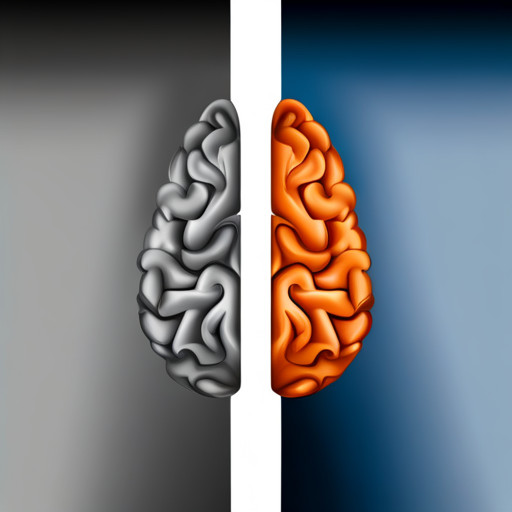Do you know that when you experience grief, it doesn’t just affect your emotions? It also affects your brain. Grief can cause structural changes in the brain and impact how it functions. Understanding how grief affects the brain can help you cope with the grieving process and find ways to manage your emotions.
Initially, grief can have a significant impact on the brain’s chemistry. When you lose someone or something important to you, it triggers a release of stress hormones like cortisol and adrenaline. These hormones can cause physical symptoms such as increased heart rate, difficulty sleeping, and loss of appetite. They also affect the way your brain processes information and emotions, leading to feelings of sadness, confusion, anger or guilt. As time goes on, these intense feelings may begin to subside but other lasting effects on the brain may remain if they’re not dealt with properly.
Key Takeaways
– Grief can cause structural changes in the brain and affect its functioning.
– During grief, the amygdala becomes hyperactive and triggers a stress response while the prefrontal cortex becomes less active, making it difficult to concentrate.
– Structural changes in the brain during grief include a decrease in hippocampus volume and reduced activity in certain areas of the prefrontal cortex.
– Unhealthy coping mechanisms or impulsive decisions may occur during grief due to changes in the brain.
The Initial Impact of Grief on the Brain

You’re probably feeling pretty overwhelmed right now, and that’s because when you first experience grief, your brain goes into overdrive trying to process it all. Your amygdala, the part of your brain responsible for emotional reactions, becomes hyperactive and triggers a stress response. This can cause physical symptoms like increased heart rate, rapid breathing, and even nausea.
At the same time, your prefrontal cortex, which is responsible for decision-making and problem-solving, becomes less active. This can make it difficult to concentrate or focus on anything other than your grief. You may find yourself forgetting things or struggling with simple tasks that used to be easy.
All of these changes in the brain are completely normal during the initial stages of grief. As you begin to process your emotions and come to terms with your loss, however, there will be structural changes in the brain during grief that will help you cope better with what has happened.
Structural Changes in the Brain During Grief

Did you know that when we experience loss, our brain undergoes physical changes that can have lasting effects on our emotions and behavior? During grief, the brain’s structure can be altered in various ways. One of the most common alterations is a decrease in the volume of the hippocampus, which plays a critical role in memory and emotion regulation.
Studies have shown that people who are grieving often exhibit reduced activity in certain areas of the prefrontal cortex, which is responsible for decision-making and impulse control. This change may explain why some individuals engage in unhealthy coping mechanisms or make impulsive decisions during the grieving process.
As you navigate through your own grief journey, it’s important to be aware of these structural changes and how they may be impacting your thoughts and behaviors. It’s also essential to seek out healthy coping strategies that can help manage your emotions during this challenging time.
Coping Strategies for Managing Grief

Managing the loss of a loved one can be overwhelming, but finding healthy coping strategies such as journaling, exercise, and seeking support from loved ones can help ease some of the pain. Journaling is a great way to express your emotions and thoughts without fear of judgment. It allows you to reflect on your grief journey and identify patterns in your feelings. Exercise has been shown to reduce symptoms of depression and anxiety while also improving overall mental health. Going for a walk or run outside can give you time to clear your mind and process your emotions.
Seeking support from loved ones is essential during the grieving process. Talking about your feelings with someone who cares about you can provide comfort and validation. Joining a support group or attending therapy sessions can also be helpful in connecting with others who are going through similar experiences. Another coping strategy is practicing self-care, such as getting enough sleep, eating well, and engaging in activities that bring you joy.
Understanding grief and how it affects the brain is crucial for navigating the grieving process. Grief triggers various changes in the brain that impact our emotional regulation, memory processing, and decision-making abilities. By learning more about these changes, we can better understand why we may be experiencing certain symptoms or behaviors during our grief journey. With this knowledge, we can then implement healthy coping strategies to manage our grief effectively without feeling overwhelmed by its effects on our brains.
The Importance of Understanding Grief and the Brain

When it comes to dealing with the grief that affects our brains, it’s important to understand that effective interventions can make a huge difference in how we cope. Whether you’re experiencing loss yourself or supporting someone who is, it’s crucial to provide the right kind of support and care. By increasing your awareness and empathy towards those going through this difficult time, you’ll be better equipped to help them find their way through their grief.
Developing Effective Interventions
Creating effective interventions for grief involves understanding how the brain processes and copes with loss. One approach is cognitive behavioral therapy (CBT), which helps individuals identify and challenge negative thoughts and behaviors associated with their grief. This can be particularly helpful for those struggling with complicated grief or depression.
Another intervention is mindfulness-based interventions, such as meditation or yoga. These practices can help individuals cope with difficult emotions by teaching them to focus on the present moment and accept their feelings without judgment. Additionally, support groups provide a valuable space for individuals to share their experiences and connect with others who are also experiencing loss.
Providing support for those experiencing loss requires a multifaceted approach that addresses both emotional and practical needs. This may include providing resources for financial assistance, helping individuals navigate legal matters related to the death of a loved one, or simply being there to listen when they need someone to talk to. By recognizing the unique challenges faced by each individual in their grieving process, we can develop more effective interventions that promote healing and resilience.
Providing Support for Those Experiencing Loss
Offering support to those who have lost a loved one can involve providing practical assistance and emotional comfort through listening and understanding. Here are some ways you can offer your support:
– Be present: Sometimes just being there for someone in their time of need is enough.
– Listen actively: Let the person share their feelings without interruption or judgment.
– Offer help: Ask if they need any specific assistance, such as running errands or preparing meals.
– Validate their emotions: Let them know that it’s okay to feel whatever they’re feeling, whether it’s sadness, anger, or confusion.
– Remember the person who passed away: Share happy memories and stories about the person with the bereaved.
By following these guidelines, you can make a meaningful difference in someone’s life during a difficult time. As we move forward into increasing awareness and empathy towards those grieving, remember that even small acts of kindness can go a long way in helping someone heal from loss.
Increasing Awareness and Empathy
Let’s explore how we can cultivate a greater sense of understanding and compassion towards those who have experienced loss. It is important to recognize that grief affects everyone differently and there is no right or wrong way to grieve. Some people may need time alone, while others may crave social interaction. As a supportive friend or family member, it is crucial to listen without judgement and offer your presence and support in any way you can.
One way to increase awareness and empathy for those experiencing loss is by educating ourselves on the different stages of grief and the emotions that come with them. The following table illustrates some common emotions felt during each stage of grief:
| Stage | Emotions |
|---|---|
| ——- | ———- |
| Denial | Shock, disbelief |
| Anger | Frustration, irritation |
| Bargaining | Guilt, regret |
| Depression | Sadness, loneliness |
| Acceptance | Peace, hope |
By acknowledging these emotions and understanding that they are a natural part of the grieving process, we can better empathize with those who are going through it. Let us all strive to be more compassionate towards those experiencing loss by offering our love and support during their difficult journey.
Frequently Asked Questions
How long does grief typically last and can it have long-term effects on the brain?
Grief varies in duration, but typically lasts from several months to a year. It can have long-term effects on the brain, such as increased risk of depression and cognitive decline.
Can grief lead to physical health problems, such as heart disease or weakened immune system?
Yes, grief can lead to physical health problems such as heart disease and weakened immune system. The stress hormones released during grief can weaken the body’s defenses and increase inflammation, which can contribute to chronic diseases.
Are there any medications or therapies that can specifically target the brain changes caused by grief?
Wow, you won’t believe the incredible breakthroughs in medication and therapy that are specifically designed to target the brain changes caused by grief! From cognitive behavioral therapy to certain antidepressants, there are options available to help ease your grieving process.
Can different types of grief, such as the loss of a parent versus the loss of a pet, have different impacts on the brain?
Different types of grief, like losing a parent or a pet, can have different impacts on your brain. The intensity and duration of the grieving process may vary, affecting regions of the brain that control emotions, memory and decision-making.
How does the brain process and cope with complicated grief, such as guilt or unresolved issues with the deceased?
When you experience complicated grief, your brain may struggle to process and cope with feelings of guilt or unresolved issues with the deceased. This can lead to prolonged and intense emotional pain, affecting your daily life.
Conclusion
So, now you know how grief affects the brain. It’s important to understand that grief is not just an emotional response, but a physical one too. The initial impact of grief can cause shock and numbness, while structural changes can occur in the brain during prolonged periods of grieving. But don’t worry – there are coping strategies you can use to manage your grief.
One example is Sarah, who lost her husband unexpectedly and felt overwhelmed with grief. She tried different coping strategies such as talking to friends and family, journaling her thoughts and feelings, going for walks in nature and practicing mindfulness meditation. Over time she noticed improvements in her ability to cope with the loss and found comfort in memories of her husband instead of feeling overwhelmed by sadness. Remember that everyone experiences grief differently, so find what works for you and be patient with yourself as you navigate this difficult journey.

